I posted a version of this on Facebook and thought I ought to send it out to our BookNotes subscribers, you who are among our best supporters and most regular customers. We’re so grateful you read our words and send orders for us to ship to you. Here’s a little essay ruminating just a bit on our past 38 years. As we say at the end, we couldn’t have done it without you. Thanks for being a part of this story.
Yesterday was the 38th anniversary of the opening of our bookstore, Hearts & Minds, here in Dallastown, PA.
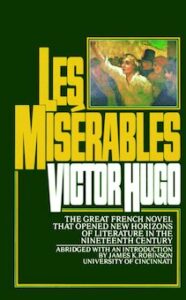 As I’ve often said, the very first book we sold that very first day we opened was a paperback of Les Miserable by Victor Hugo. (This was in 1982, by the way, before the powerful musical made “Les Mis” and Victor Hugo a household name.) A deeply Christian classic novel, so different then most of the so-called “Christian fiction” of the 1980s, we were delighted for that to be our first sale and took it somehow as a sign from above: God smiled upon our youthful hopes to create a bookstore that was a bit different than the typical religious shops of the day.
As I’ve often said, the very first book we sold that very first day we opened was a paperback of Les Miserable by Victor Hugo. (This was in 1982, by the way, before the powerful musical made “Les Mis” and Victor Hugo a household name.) A deeply Christian classic novel, so different then most of the so-called “Christian fiction” of the 1980s, we were delighted for that to be our first sale and took it somehow as a sign from above: God smiled upon our youthful hopes to create a bookstore that was a bit different than the typical religious shops of the day.
We have written before about our desire to be a bit more thoughtful and ecumenical as a bookstore than some evangelical stores, offering more meaty books than are often found, without being an academic bookstore. We carry gifts and crafts, cards and music, and a fair share of inspirational bric-a-back, but wanted to stand out as a bookstore. When we opened, most religious shops still called themselves bookstores and in our lifetimes many switched to calling themselves “Christian stores” which meant teeshirts and Jesus junk; they’ve even got “Christian toothbrushes.” You know our story of trying to carry books from a Christian perspective across the whole range of life and career areas, titles about engineering and politics and psychology and art and business. You’ve heard me tell stories of folks who have entered our store and, seeing books on ecological studies, have asked, confused, where the Christian bookstore in Dallastown is. Because we carry books on science and film, they can’t imagine that we are that Christian bookstore. And so, it’s been a wild ride these years…
We wouldn’t have been able to open 234 East Main if it weren’t for tons of friends who pitched in (many from Pittsburgh) and our very generous and helpful families, who volunteered, cooked, did accounting paperwork, worked in the shop, cared for our children, and delivered packages (and, let’s admit it, threw good money after bad) for years and years. Of course, we are thankful for many who volunteered and covered for us, for early employees and staff, and for our current team of the last decade, all who love books and care for our customers in ways that humble and honor us.
If you’ve ever worked here — even for a while — I trust you’ll forgive us for not living up to our ideals of doing things a bit differently, with good cheer and a sense of community that promotes theological care for an open-minded, ecumenical book selection, always putting people above profits. We’ve dropped the ball more times than we can say, but we cling to the goodness of God who seems to have guided and sustained us as we’ve tried to be a space for many different kinds of folks to learn about many different kinds of books. What a blast that has been; we hope our corner of the world is a bit better because of the ideas launched through these books we’ve researched, studied, curated, ordered, stocked, shown, and sometimes sold. We thank those who showed up and worked hard for us, seeing this more as ministry than lucrative wage earning.
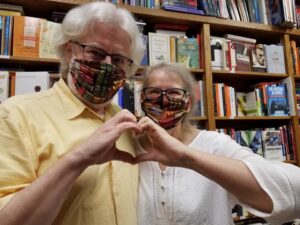 We’ve been encouraged and blessed by many in our industry — authors whose names you may know, publishing leaders whose names you most likely don’t, and bunches of faithful sales reps, order takers, supply chain workers, (USPS carriers, UPS and FedEx drivers), publishers and editors, book cover designers, publicity and PR teams, and others who make this whole industry work as well as it does. We are thankful to play a small part in a bigger industry that has changed much over the decades and is facing very hard times now. On this weekend of commemoration, I won’t rant about the industry, the dangers of Amazon, and the vexation of moving forward during Covid. But it worries us a lot. We trust God and forge ahead, I guess, recalling what Francis Schaeffer wrote in True Spirituality so many decades ago: the world is abnormal. Or, as Cornelius Plantinga put it in a beautiful book on sin, swiping a line from the movie “Grand Canyon”, things are “not the way it’s supposed to be.” Got it.
We’ve been encouraged and blessed by many in our industry — authors whose names you may know, publishing leaders whose names you most likely don’t, and bunches of faithful sales reps, order takers, supply chain workers, (USPS carriers, UPS and FedEx drivers), publishers and editors, book cover designers, publicity and PR teams, and others who make this whole industry work as well as it does. We are thankful to play a small part in a bigger industry that has changed much over the decades and is facing very hard times now. On this weekend of commemoration, I won’t rant about the industry, the dangers of Amazon, and the vexation of moving forward during Covid. But it worries us a lot. We trust God and forge ahead, I guess, recalling what Francis Schaeffer wrote in True Spirituality so many decades ago: the world is abnormal. Or, as Cornelius Plantinga put it in a beautiful book on sin, swiping a line from the movie “Grand Canyon”, things are “not the way it’s supposed to be.” Got it.
But, of course, it is to our customers (many who have become friends) to whom we owe the biggest debt of gratitude. Truly. This weekend of thanksgiving we are deeply grateful for those who have trusted us with their hard questions, who have asked for book advice, who have put us to work finding titles they need, who have browsed our shelves and found surprising treasures (and who had the candor to tell us when they found stinkers and titles that caused trouble.) We thank those who have shelled out their hard- earned money. We thank you for that.
Beth and I are tired from the long hours of these long years, willing to admit that it’s been harder than we expected, but we are cheered when we think of many fine conversations with many fine folks about books and ideas, authors and writing, words and wisdom. Nearly every day we are reminded about the impact we make by getting books to readers. “Read for the Kingdom!” I used to shout, sometimes, at evangelical gatherings; “Books can help transform your vision and move us to work for change,” I might say to others. Or, perhaps a blessing of sorts, to some: “May these titles touch your heart and shape your soul in healthy, good ways.” In any case, our customers know that books matter, that reading is a spiritual discipline that can change us from the inside out, and that the very willingness to learn from others — through fiction, nonfiction, poetry or prose — is an essential virtue that makes us better people and this world a better place. Today, especially, we thank our customers who have kept us going, in more ways than one.
We thank, also, those institutions that have partnered with us; schools and libraries and social change organizations and, of course, many local churches; we thank you. We’ve loved selling books with and for ministries such as our beloved CCO (Coalition for Christian Outreach.) I’m sure some tire of us talking about their Jubilee conference, but it has been more than an annual big gig for us, but the center of our liturgical calendar and a touchstone for why we do what we do. We’ll be somehow selling books on line there this year at Jubilee 2021.
On this Hearts & Minds anniversary we think back to the old days setting up book displays for the York Council of Churches (does anybody remember the local Faith Is Alive Christian Ed conferences?), the epic Pennsylvania State Council of Churches events in Harrisburg —  where for the first time I heard Walt Brueggemann and Jürgen Moltmann, the same day) and conferences by groups like the C.S.Lewis Institute, Ivy Jungle, Redeemer’s Center for Faith & Work in NYC, Q, CIVA, OneLife, Northeast APCE, Wee Kirk, CLS, Fresh Expressions, CLAC, ESA, CPJ, BFW, The Jonathan Edwards Institute, and the Mercersburg Society, not to mention several regular denominational gatherings, from UCC to Episcopalian, from Presbyterian to Lutheran.
where for the first time I heard Walt Brueggemann and Jürgen Moltmann, the same day) and conferences by groups like the C.S.Lewis Institute, Ivy Jungle, Redeemer’s Center for Faith & Work in NYC, Q, CIVA, OneLife, Northeast APCE, Wee Kirk, CLS, Fresh Expressions, CLAC, ESA, CPJ, BFW, The Jonathan Edwards Institute, and the Mercersburg Society, not to mention several regular denominational gatherings, from UCC to Episcopalian, from Presbyterian to Lutheran.
We’ve set up at Catholic retreat centers and Christian rock festivals (Purple Door!), at camps and revivals and protest marches and once at the National Press Club. I’ve lectured on books in countless venues; we’ve set up in rec rooms of college student dorms at the beach and in fancy halls at Ivy League colleges and fine (and not so fine) hotels. We’ve sold books and spoken at events in New York and New Orleans, in Dallas and Denver. We’ve set up books in urban justice centers and at rural nonprofits. And of course we delivered book displays to more church basements than we can remember. We love the church basements.
We’ve worked with authors as distinguished as Os Guinness and Barbara Brown Taylor and William Willimon and Tim Keller (loading out, once, from a very fancy, marbled museum in Pittsburgh) and with edgy activists like Shane Claiborne,Lisa Sharon Harper, Nadia Bolz-Weber. I’ve spoken (like a bookish warm-up act) before Brennan Manning and Fleming Rutledge and John Piper and Rich Mullins and Eugene Peterson; Phyllis Tickle once quipped that Hearts & Minds is the very center of the universe. I’ve had the remarkable fortune to interview authors I love such as Michael Card, Lauren Winner, Andy Crouch, Ruth Haley Barton, Jamie Smith. I think the first event we ever did in the store was with Jim Wallis; or maybe Brian Walsh; both were before we expanded the store in the mid 1990s. The most recent, on Zoom, was with Gina Delfonzo and Karen Swallow Prior as we talked about Charles Dickens. Our two largest Dallastown events were with N.T. Wright and another with Amish novelist Beverly Lewis.
These days, with Covid on the rise and the store still closed, we have quick conversations through people’s car windows or standing in the breeze out back. If it weren’t a sign of our grim times, it would be sort of fun, this backyard customer service and curbside delivery.
Most of our customers these days, and I suspect most reading this, are mail-order friends — on-line shoppers and those who read BookNotes and send us orders and, often, encouraging notes. (Or cancel their subscription and send us hate mail, but I digress.) We opened before there was a thing called “Small Business Saturday” or “Cyber-Monday” and we continue on, eyes on the prize, glad for those who support independent and family-owned businesses and who appreciate our odd effort to be a bookstore unlike most, with an unusual blend of passions and the books to prove it. We’re so thankful for those who subscribe to BookNotes, who read (and share) our book reviews, who send us orders, who spread the word. We appreciate you all more than words can say.
I’ve shared this lively video before, but if you want to hear me ramble on about the power of books, the need to read widely, the pleasure and importance of the printed page, this talk I gave at an evening gathering last year at Grove City College is an example of the sorts of notions that often run through our heads as we talk about our work and the Christian perspective that we think shapes us. I was so glad to be with friends out in Western Pennsylvania again and appreciated their trust in allowing me to talk about reading and books to their students and friends. Even though it was presented for collegiates, I think many will enjoy hearing me enthusiastically preaching about books and what they can do for us. Enjoy!
https://livestream.com/accounts/13431056/events/8792551/videos/197856283
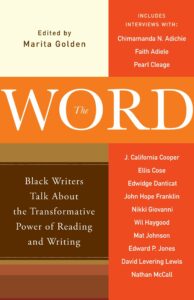 The Word: Black Writers Talk about the Transformative Power of Reading and Writing edited by Marita Golden (Broadway Books) $14.99 || OUR SALE PRICE = $11.99
The Word: Black Writers Talk about the Transformative Power of Reading and Writing edited by Marita Golden (Broadway Books) $14.99 || OUR SALE PRICE = $11.99If you have heard me speak at any length about what books can do for us and the value of reading, you may have heard me read out loud from the first few pages of this marvelous anthology of black writers. In the opening, Marita Golden offers vignettes of her own reading life — as a youth (reading Oliver Twist and Vanity Fair), as a teen coming into her own as a young, black woman, as a person coping with the hard stuff of life (she’s tells about reading Tony Morrison’s Beloved) and as a wife contemplating her bad marriage, reading Madam Bovary. I read it early in my talk at Grove City College that I linked to above, if you saw that. Often, after offering presentations when I use this resource, folks want to know what book it was that I read from. Highly recommended.
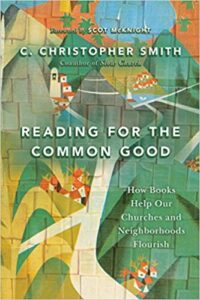 Reading for the Common Good: How Books Help Our Churches and Neighborhoods Flourish C. Christopher Smith (IVP) $16.00 || OUR SALE PRICE = $12.80
Reading for the Common Good: How Books Help Our Churches and Neighborhoods Flourish C. Christopher Smith (IVP) $16.00 || OUR SALE PRICE = $12.80You can read my longer review here, but know that this is one book I esteem almost more than any other, because it names so much of what and why we do what we do. I adore this book.
I wish more would know this content, talk about this stuff, share this book, explore it in groups. It is important and good and we so admire the work Chris has done with his team at Englewood Review of Books.
As missional scholar Alan Roxburgh notes in one review, “Reading isn’t a technique. It’s about cultivating the practice of discernment through dialogue with others.” It is, especially in our polarized culture, as Tim Soerens notes, in his rave review, “subversive.” Slowing down and listening? That’s a habit we get from reading, and especially from reading together. This is much of what Chris is exploring here (and which was developed further in his recent book about conversation, How the Body of Christ Talks.)
Here is how the publisher has described Reading for the Common Good:
We have been created to live and work in community. But all too often we see ourselves primarily as individuals and run the risk of working at cross-purposes with the organizations we serve. Living faithfully in a neighborhood involves two interwoven threads: learning and action. In this book C. Christopher Smith, coauthor of Slow Church, looks at the local church as an organization in which both learning and action lie at the heart of its identity. He explores the practice of reading and, in his words, “how we can read together in ways that drive us deeper into action.” Smith continues, “Church can no longer simply be an experience to be passively consumed; rather, we are called into the participatory life of a community. Reading is a vital practice for helping our churches navigate this shift.” Discover how books can help your churches and neighborhoods bring flourishing to the world.
Listen to memoirist and essayist Scott Russell Saunders:
In this hectic age, with its flood of electronic scraps aimed at five-second attention spans, how refreshing it is to meet a champion of slow, sustained and meditative reading of books. And not just any books, but ones that nurture compassion and community. Chris Smith illustrates in his own work and in his account of the work of his church what it means to love one’s neighbor. It means more than kindly feelings. It means kindly actions. It means caring for others, beginning with those who share the place where we live, and above all those who are most in need. The wealth Smith celebrates is not to be found in stock markets or bank accounts, but between the covers of books, between person and person, and in the loving heart.
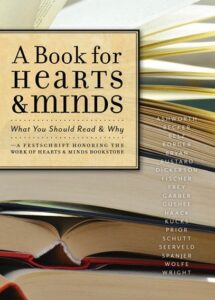 A Book for Hearts & Minds: What You Should Read & Why (A Festschrift Honoring the Work of Hearts & Minds Bookstore) edited by Ned Bustard (Square Halo Books) $18.99 || OUR SALE PRICE = $15.19
A Book for Hearts & Minds: What You Should Read & Why (A Festschrift Honoring the Work of Hearts & Minds Bookstore) edited by Ned Bustard (Square Halo Books) $18.99 || OUR SALE PRICE = $15.19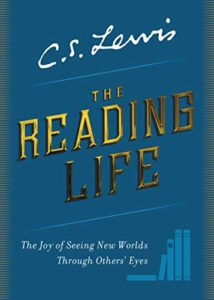 The Reading Life: The Joy of Seeing New Worlds Through Other’s Eyes C.S. Lewis (HarperOne) $19.99 || OUR SALE PRICE = $15.99
The Reading Life: The Joy of Seeing New Worlds Through Other’s Eyes C.S. Lewis (HarperOne) $19.99 || OUR SALE PRICE = $15.99
Maybe you will recall us describing this when it came out a year ago. What a great idea, pulling together various writings of the Oxford don from his letters, essays, and books, about the value of reading, the joys of reading, his own love of books and his advice for readers and writers. You can read in one volume his review of J.R.R. Tolkien, some of his reflections on science fiction, and several pieces on children’s books. And, of course, the often cited chapters on the importance of reading old books.
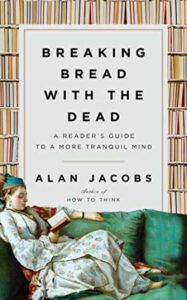 Breaking Bread with the Dead: A Reader’s Guide to a More Tranquil Mind Alan Jacobs (Penguin Press) $25.00 || OUR SALE PRICE = $20.00
Breaking Bread with the Dead: A Reader’s Guide to a More Tranquil Mind Alan Jacobs (Penguin Press) $25.00 || OUR SALE PRICE = $20.00
I could just as easily commend the wonderful Oxford University Press book by Professor Jacobs called The Pleasures of Reading in an Age of Distraction — yes, he reminds us, highbrow thinker that he may be, that in all our concerns about the lack of reading, “amusing ourselves to death” in “the shallows” and other rants against the demise of reading in our tech-driven, digital age, that we are to enjoy reading. Life’s too short to waste much time or books we don’t like, I say, so, yep, The Pleasures of Reading is a gem.
Still, Breaking Bread with the Dead is named here, though, because, well, it’s a reminder many of us need. We are not too snooty here at the bookstore and we don’t sell many of the great classics to elite readers, no matter what Mr. Lewis recommended. (I’ve been known to push back on this thesis about chronologically snobbery, by the way, noting that his privileging older books is its own sort of chronological snobbery!) Having said that, we do need to attend to what Jacobs so richly and eloquently reflect on here. What a book it is, one of the best, deepest, reading experiences this year.
I may or may not have understood all he was writing about and I may or may not have ever heard of some of the authors he mentioned. Okay, I didn’t. No matter. Breaking Bread with the Dead is a moving, detailed, and compelling argument for taking seriously old books, especially in our season of restlessness and melancholy.
We reviewed this at BookNotes briefly here and we still have it at that 20% off discounted price. Highly recommended.
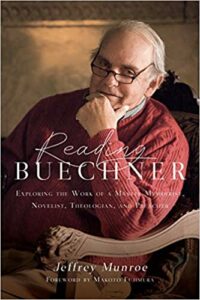 Reading Buechner: Exploring the Work of a Master Memoirist, Novelist, Theologian, and Preacher Jeffrey Munro (IVP) $18.00 || OUR SALE PRICE = $14.40
Reading Buechner: Exploring the Work of a Master Memoirist, Novelist, Theologian, and Preacher Jeffrey Munro (IVP) $18.00 || OUR SALE PRICE = $14.40
Few authors capture the range and quality of what we want to be about here as much as this Presbyterian pastor who helped create the modern interest in religious memoir, was nominated for a Putlizer Prize for exceptional novels, and whose witty theology is both meaty and winsome. That some evangelicals and even Catholics liked this mainline Protestant pastor, that secular literary types and heady theologians took him seriously, is just wonderful.
This fabulous book by Jeffrey Munro, executive vice president at Western Theological Seminary (where he also teaches writing) is for those who love Buechner (obviously) and a great prelude and orientation for those who don’t know much about him. This really is, as the publisher promised on the back, “an authoritative new introduction to one of best spiritual writers.”
As I wrote in a brief review at BookNotes a year ago, “There is a lovely, powerful forward by visual artist and writer Makoto Fujimura and blurbs on the back of this book are from the well-known Marilyn McEntyre, Michael Card, John Wilson, and Calvin University English prof and co-director of the Calvin Festival of Faith & Writing Jennifer Holberg who commends it to both newcomers and longtime readers of Mr. Buechner.”
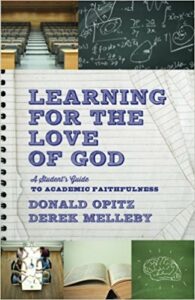 Learning for the Love of God: A Student’s Guide to Academic Faithfulness Donald Optiz & Derek Melleby (Brazos Press) $17.00 || OUR SALE PRICE = $13.60
Learning for the Love of God: A Student’s Guide to Academic Faithfulness Donald Optiz & Derek Melleby (Brazos Press) $17.00 || OUR SALE PRICE = $13.60
This is one of those books that I mention often at BookNotes. It is about how college students can see their ordinary academic work as a way to worship God, an easy-to-read introduction to one of the most significant tropes that shaped my life and the founding of our bookstore — that we can somehow relate faith and scholarship, that a Christian lens affords us with a unique perspective to understand learning and its relationship to living well. With blurbs from world class scholars like George Marsden (and the advice from James K.A. Smith on the back saying to “buy a box of these and give them to every high school senior you know”) Learning for the Love of God is not only highly regarded, but is important.
I remind you of it here, now, for three reasons.
First, this really is the most whimsical and upbeat guide to this whole movement of worldview and culture-making and vocation and the call to distinctively Christian scholarship that early on shaped the vision and texture of our store. Granted, aspiring serious scholars should read, at least, Habits of the Mind: Intellectual Life as a Christian Calling by James Sire and Fabric of Faithfulness: Weaving Together Belief and Behavior by Steve Garber and George Marsden’s little Oxford University Press book, The Outrageous Idea of Christian Scholarship which is vital, and inspired Opitz & Melleby, working your way to the magisterial The Myth of Religious Neutrality: An Essay on the Hidden Role of Religious Belief in Theories by philosopher Roy Clouser. Richard Mouw’s wonderful, recent, All That God Cares about: Common Grace and Divine Delight has a couple of pages about us, quoting from a long BookNotes column where I explained why this stuff matters to us so much, suggesting it is my evangelical sort of take on the “all of life redeemed” vision of Abraham Kuyper and the implications for thinking, learning, and scholarship in service of societal reformation. What an honor to have an author like Dr. Mouw cite us as illustrative of something interesting. Whew.
Optiz and Melleby — perhaps goaded by me, I don’t know about that — knew deep in their bones that this vital tradition of reformational scholarship was life changing and yet often missing the mark of young students who were church kids but had no tools to “think Christianly” about their college classes and task as young scholars. They worked well to create a solid but accesible introduction to this transformative stuff and it says so much about how Beth and I see our role as booksellers that it seems right to highlight it here, now.
Secondly, beside it being a window into much of what we think is important about young adults in college and taking faith into the classroom, I think — I hope you believe me — that this could be helpful to anyone who wants a breezy and quick read that invites them into life-long learning, a discerning wisdom about being “in but not of” the worlds of culture and knowledge. I know of Christians with a wild and wide imagination and they feel guilty, as if studying God’s world is somehow not spiritual enough; this book will help. I know others that don’t feel guilty, but maybe they should, because they study any old thing under the sun without any intentional or coherent way of relating their faith to their daily learning.n Again, this book will help. With so much fake news out there and so much confusing about thinking well, this call to joyful, intentional Christian learning is worth every page.
Thirdly (okay, sorry if this is what rhetoricians call “special pleading”) the book is dedicated to me. I get choked up sometimes thinking about it, or seeing it there when I’m showing somebody the book. Gulp. Come on, folks. It’s our store’s anniversary! Buy this book that somehow has some connections to the decades of work of Beth and me here at Hearts & Minds.
BookNotes

SPECIAL
DISCOUNT
20% OFF
ANY BOOK MENTIONED
+++
order here
this takes you to the secure Hearts & Minds order form page
just tell us what you want
inquire here
if you have questions or need more information
just ask us what you want to know
Hearts & Minds 234 East Main Street Dallastown PA 17313
read@heartsandmindsbooks.com
717-246-3333
